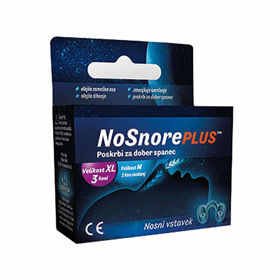Snoring is a sound during sleep when air vibrates against soft tissue through narrowed passages in the mouth, nose, and throat. This can cause noise that can sound like noisy, annoying sounds. Snoring is very common, but it can happen to people of all ages and genders and can be a sign of an underlying health problem, such as sleep apnea.
SNORING: Symptoms of snoring | Consult with a doctor | Causes of snoring | Treatment | Conventional Medicine | Alternative ways | Snoring Prevention | Questions and Answers| Sources/references
Symptoms of snoring
Rough, raspy, oscillating sounds during breathing in sleep, varying in pitch and volume.
Consult your doctor if:
- You live with a snorer and notice that he snores very loudly or pauses in between without breathing. It can be obstructive sleep apnea, a severe breathing disorder.
- You are often very sleepy during the day. You may have obstructive sleep apnea, a severe disorder that prevents you from getting enough oxygen while you sleep.
- You often fall asleep in inappropriate circumstances, e.g., at work or eating. In addition, you may have obstructive sleep apnea or narcolepsy, a disorder that causes sufferers to fall asleep during their regular waking hours.
Image: Upper respiratory tract view.

Snoring is usually not a severe problem. It is 50% more common in men than women, but most people snore occasionally. Chronic snorers are usually middle-aged and overweight. Sometimes, however, snoring can warn of a dangerous health disorder. The worst is obstructive sleep apnea, in which the snorer stops breathing; cessation lasts a few seconds to two minutes. The result is a drop in oxygen in the blood, which at best causes fatigue and, at worst, can lead to sudden death. If you think you have this disorder, you should get conventional treatment.
Regular - often loud - snoring indicates other potentially annoying problems; such snoring can be classified into two groups: moderate (snoring that occurs whenever the individual sleeps but may be interrupted or occurs only when lying on the back) and severe (loud snoring throughout sleep, regardless of position). Fortunately, the severity of snoring can be reduced or even eliminated with various measures.
Causes of snoring
Snoring is caused by the fluctuation of the soft palate that occurs as the lungs struggle to inhale oxygen through narrowed airways. This usually happens when the muscles that keep these pathways open become too loose. Thus, any condition or substance that increases muscle relaxation can have an effect. These include alcohol, medication (e.g., sleeping pills, cold pills, or antihistamines), too soft or too big a pillow, sleeping on your back, poor muscle tone, or obesity.
Video content: why do we snore at night?

Obstruction can also be caused by abnormalities, such as an excessively long soft palate or tongue or nasal septum deviation. In children, snoring is often caused by an enlarged pharynx or tonsils. In addition, obstruction can be caused by any disease that causes a narrowing of the bronchial passages, such as asthma. Smoking, which irritates the respiratory tract, also contributes to worsening snoring.
DIAGNOSTIC PROCEDURES
The doctor will first ask about any allergies you may have, dietary habits, medications you are taking, and whether you drink alcoholic beverages or smoke. If the fault is not in these factors, he will examine the nose and throat to detect abnormalities.
If he suspects you have obstructive sleep apnea, he may ask your partner to keep a diary with notes about your sleep pattern. He can also refer you to a sleep test, during which, among other things, they will determine when and how often you stop breathing during sleep.
How to get rid of snoring
Snoring usually does not require medical treatment; a slimming diet and restricting smoking and alcohol usually eliminate the problem.
Alternative methods can also help. However, in more complex cases, Frbut surgery may still be necessary.
CONVENTIONAL MEDICINE
If the snoring is mild, no action is necessary. If allergies are the cause, the doctor will probably prescribe antihistamines or nasal decongestants. Snoring due to abnormalities in the nose or throat sometimes requires surgery to allow the air to flow smoothly. If the doctor determines that it is obstructive sleep apnea, the treatment will be more aggressive, as the possible consequences of this disorder can be dangerous.
ALTERNATIVE METHODS
If the cause of snoring is allergies, asthma, bronchitis, or emphysema, many alternative methods can help open the airways and help you sleep more peacefully.
PREVENTION
- Losing some weight might be a good idea: most snorers are overweight. Eliminating excess fat has been proven to reduce or even eliminate snoring significantly.
OBSTRUCTIVE NOCTURNAL APNEA
1 to 5% of adults suffer from a snoring disorder that is no joke: obstructive sleep apnea. This disorder, which usually affects men (9 out of 10 patients are men), is characterized by stopping breathing more than 29 times during 7 hours of sleep, each lasting 10 seconds or more. Individuals with a severe form of the disease do not breathe there for up to three-quarters of the time during sleep.
The result is a lack of oxygen and high blood pressure; in the most severe cases, the disease can be fatal.
Video Content: Sleep Apnea

If you snore loudly and forcefully, you may have obstructive sleep apnea; you should consider a sleep test, during which your sleep pattern will be investigated, and treatment will be advised based on the findings.
- Avoid late-night snacks and alcoholic beverages: drinking alcohol or eating a large meal before bed causes muscle weakness.
- Avoid sleeping pills and other sedatives. Although they help you fall asleep, they relax the neck muscles and worsen snoring.
- Quit smoking. Smoking causes nasal and respiratory mucosa swelling, one of the leading causes of snoring.
- Sleep on your side. Severe snorers snore regardless of position, while moderate snorers generally only snore when they sleep on their backs. One way to avoid this is to sew a pocket on the back of your pajamas and put a tennis ball in it. Lying on your back will thus become uncomfortable, and you will turn to your side while sleeping.
- Sleep without a pillow. The pillow causes the neck to bend and thus can contribute to the difficult passage of the airways.
Sources and references
Source: Family Health Guide. Conventional and alternative treatment, Dr. Jajo Lajovic, Publishing House Mladinska knjiga
1. Insomnia -https://www.nhsinform.scot/illnesses-and-conditions/mental-health/insomnia
2. Insomnia - https://www.mayoclinic.org/diseases-conditions/insomnia/diagnosis-treatment/drc-20355173













